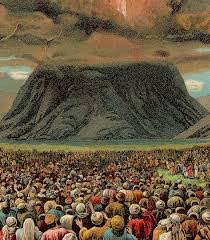Dear Congregation Beth Israel members and friends,
Of all the holidays in the year, Shavuot often gets short shrift. Many Reform congregations hold Confirmation at this season, which is a lovely tradition, but doesn’t fully convey the depth of what this holiday can be. Shavuot isn’t just a graduation celebration for tenth graders; it’s one of the most profound anniversaries in the Jewish year. And this year, we’re celebrating it at CBI in a new way: with music, music, music!
 Shavuot is a festival of first fruits, the culmination of the Counting of the Omer, and the day when we celebrate the revelation of Torah. Torah teaches that on the 50th day after leaving Egypt, we encamped around the base of Mount Sinai. Amidst thunder and fire on the mountaintop God spoke, and we received Torah.
Shavuot is a festival of first fruits, the culmination of the Counting of the Omer, and the day when we celebrate the revelation of Torah. Torah teaches that on the 50th day after leaving Egypt, we encamped around the base of Mount Sinai. Amidst thunder and fire on the mountaintop God spoke, and we received Torah.
Midrash offers us many visions of this moment. In one, God spoke in a voice that all the people could hear, in every language at once. God spoke the Ten Commandments, or maybe the whole Torah, or maybe the whole written Torah and Oral Torah (the Talmud and commentaries). Or maybe God spoke all of that and also every bit of Jewish wisdom that would ever be created. Or maybe God just spoke the first word and all of the rest was implied. Or maybe God just spoke the silent letter alef at the start of the first word, and all the rest has been streaming into creation ever since, a divine broadcast that never ends…
For seven weeks we’ve been counting the Omer, the 49 days between Pesach / liberation and Shavuot / revelation. Shavuot is the 50th day, and on that date each year we stand together at a metaphysical Mount Sinai and receive revelation anew.
Revelation is ongoing. It isn’t just what happened to “them” back “then” – it’s also here and now. Our tradition offers us tales of students who sought to see how their teachers tied their shoes and how they behaved at home, saying, “This, too, is Torah!” Torah isn’t just the words on the page, though those words are core to our tradition and we cherish them. Torah is also how we act, what we do, our ethical choices. And when we beautify our traditions with art and with music, that, too, is Torah.
Enter this year’s Shavuot celebration: a concert titled Jewish Music: This, Too, is Torah! We’ll gather at 3pm on Sunday, June 9 to hear Jewish music from across the ages.
Some of the oldest music we’re offering dates back many centuries, written in a call-and-response style reminiscent of Gregorian chant. (Gregorian chant was popular around the 9th century CE. Some musicologists suggest that early Christian psalm-chanting was heavily influenced by Jewish modes of chanting the psalms when the Temple stood, in which case the melody we’re singing may be much older.) Some of the music we’ve learned is polyphonic harmony written during the Renaissance. Some of it comes from famous Reform composers of the 1800s. Some of the music was written by 20th century Israeli or American composers.
Some of the music we’re offering features Sefardic melodies and musical modes from Jewish communities of Spain, Morocco, Iraq and north Africa. Some is Ashkenazi, rooted in the musical soil of eastern Europe. Some of it draws on the special musical mode we use only on festivals like Shavuot. Some of it is settings of Hallel, psalms 113-118, traditionally sung at festivals. Some of it is settings of prayers or poetry. I can’t wait to share it with y’all.
With the title “This, Too, is Torah,” we hope to convey a sense of awe at the vast depth and breadth of Jewish musical creativity. Torah is our inheritance as a people, and so, too, is all of this amazing music.
After the concert there will be a potluck feast; please note on the sign-up sheet what you’re bringing to the potluck. Because Torah is compared to milk and honey, it’s Ashkenazi tradition for Shavuot meals to be dairy-based rather than meat-based. (Think: cheesecake, cheese blintzes, noodle kugel…) So please bring something vegetarian, pescatarian, or dairy to our early Shavuot supper. And, a reminder: please sign up to attend the concert via our website so we know how many chairs to set up.
For ease of participation, we’re holding our Shavuot concert a few days before the actual festival. Shavuot begins at sundown on the Tuesday night that follows our concert. If you’re looking for a late-night Shavuot Torah learning adventure, some members of our choir are also members at Temple Israel in Greenfield and will be participating in the tikkun leyl Shavues (late-night learning jam) there, which will begin at 8pm on Tuesday, June 11.
At this season, many of my rabbinic colleagues and I end our emails with, “See you at Sinai!” Tradition says that all Jewish souls who ever were and ever will be were all mystically present at Sinai to receive Torah together. I like to imagine that when we gather wherever we are to celebrate Shavuot, we’re all connected, as though our souls could wave to each other from wherever we are. I can’t wait to see y’all at Sinai – this year, with music to open the heart and stir the soul, and an early supper to celebrate Torah in community together.
See you at Sinai,
— Rabbi Rachel





